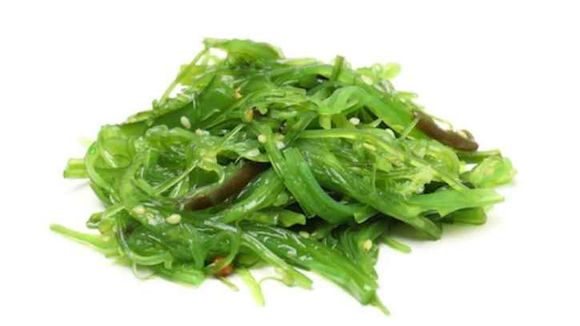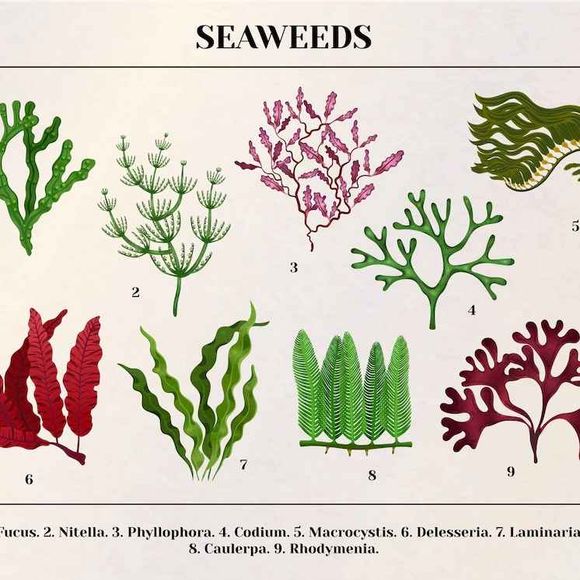The most important facts about algae
Algae grow in or near salt waters. They usually contain many minerals that the body easily breaks down and uses to maintain optimal health. First of all, seaweed is an excellent source of iodine - a vital trace element that plays a critical role in thyroid health. The body does not produce iodine on its own, so you need to get it from food sources and/or supplements.
Algae are categorized according to their color and some other factors, the most famous being:
- Nori
- Kelp
- Wakame
- Kombu
- Dulce
- Blue-green algae, such as spirulina and chlorella and others.
Each type of algae may contain slightly different nutrients and minerals, but it can certainly be considered a healthy food. Including seaweed in the menu can be an easy way to increase your intake of vitamins and minerals without taking in extra sugar, calories and more. As a study in Marine Drugs notes, seaweed is usually a good source of: [ref. 1]
- Protein
- Carbohydrates
- Fiber
- Minerals
- Polyunsaturated fatty acids
According to another study in the Journal of Applied Phycology, different types of seaweed contain the following beneficial nutrients:
- Vitamin C
- Vitamin B
- Vitamin A
- Vitamin E
- iron
- iodine
8 Amazing Health Benefits of Algae

Algae to support thyroid function
The thyroid gland plays a crucial role in overall health, and the iodine they provide plays a vital role in its ability to function properly. Insufficient iodine levels mean that the thyroid gland cannot produce enough thyroid hormone (a condition known as hypothyroidism) that regulates many bodily functions. If you're not getting enough iodine, you may develop goiter or other conditions.
This is the average iodine content of three different dried algae:
- Nori: 37 mcg per gram (25% of RDI)
- Wakame: 139 mcg per gram (93% of RDI)
- Kombou: 2523 mcg per gram (1682% of RDI)
The kelp is one of the best sources of iodine. Just one teaspoon (3.5 grams) of dried algae can contain 59 times the RDI. Seaweed also contains an amino acid called tyrosine, which is used together with iodine to produce two key hormones that help the thyroid gland for optimal function.
Algae for improved gut health
Seaweed contains carrageenans, agaras, fucoidans, which act as prebiotics, indigestible fiber that feed healthy bacteria in the digestive tract. Sulfated polysaccharides (sugars found in seaweed) help increase the growth of good bacteria and increase short-lived fatty acids that keep the lining of the gut healthy.
Algae for cardiovascular health

Some studies have shown that algae intake can help reduce blood pressure. It may also help reduce LDL cholesterol and total cholesterol levels. The results of human studies are promising, but more in-depth data is needed.
Algae to stabilize blood sugar
Brown algae contain fucoxanthin, an antioxidant that may play a role in helping improve blood sugar control and reduce the risk of developing type 2 diabetes.
A good source of vitamins and minerals
Each type of algae has a unique set of nutrients. Sprinkling a little dried seaweed on your food not only adds flavor, texture, and aroma, but it's an easy way to increase your intake of vitamins and minerals. Typically, 1 tablespoon (7 grams) of dried spirulina can provide:
- Riboflavin: 20% daily value (DV)
- Thiamine: 14% DV
- Iron: 11% DV
- Manganese: 6% DV
- Copper: 47% DV
Seaweed also contains small amounts of vitamins A, C, E and K, along with folate, zinc, sodium, calcium and magnesium. [ref. 2] In terms of nutrients, the proteins present in some seaweed, such as spirulina and chlorella, contain all the essential amino acids. Therefore, seaweed is an excellent choice for vegetarians and vegans who need plant-based sources of protein.
Contains a variety of protective antioxidants
In addition to the content of antioxidant vitamins A, C and E, seaweed provides a wide variety of beneficial plant compounds, including flavonoids and carotenoids. They have been shown to protect your body's cells from free radical damage. 3
Many studies have focused on one particular carotenoid called fucoxanthin, which we mentioned earlier. It is the main carotenoid found in brown algae, such as wakame, and has 13.5 times the antioxidant capacity of vitamin E.
Algae May Help with Diabetes
Fiber-rich foods can help with diabetes. This is because high amounts of fiber help regulate blood sugar and insulin levels. Adding seaweed to the diet can help increase a person's fiber intake without a large increase in calories intake.
A 2018 study in rats found that compounds in one type of seaweed can directly reduce markers of type 2 diabetes, such as high blood sugar. Seaweed is also rich in unsaturated fatty acids and polyphenolic compounds. Many of these seaweed components are beneficial for human health, including in diabetes management. [ref. 3]
Algae can help with weight loss

The fiber in seaweed can be beneficial for people who are trying to lose weight. This is because fiber is low in calories and helps a person feel full. According to the study in Marine Drugs, a large amount of dietary fiber slows down the emptying of the stomach. As a result, the stomach can slow down sending hunger signals to the brain, which can help prevent overeating.
Algae May Reduce Cancer Risk
Adding seaweed to your diet can help reduce your risk of developing certain cancers. It can reduce estrogen levels, which lowers the risk of breast cancer. Unfortunately, there are few human studies, so more research is needed to confirm these effects.
How to eat seaweed
There are many options for including algae in the menu, such as:
- Substitution of tortillas, bread and packaging with dried nori leaves used to make sushi.
- Flavoring lentils soups with kombu. This can reduce the risk of meteorism due to the healthy enzymes of these algae.
- Use of toasted seaweed or seaweed husks as topping on cereals, such as rice or quinoa. This can help reduce the amount of salt or soy sauce a person takes.
- Add seaweed to vegetable soup. This is a good option for people who do not like the taste of seaweed.
Some risks to consider when consuming algae
Eating fresh seaweed is generally considered safe for most people. Although these plants offer many health benefits, there are a few things to watch out for:
- Too much iodine. While iodine is a vital trace element for thyroid health, too much of it can backfire.
- It can affect some medications. Seaweed contains a large amount of potassium, which can be harmful to people with kidney disease. Seaweed also contains vitamin K, which can interfere with blood-thinning drugs such as warfarin.
- Some types of algae may have high levels of heavy metals. Some varieties of seaweed may contain high levels of arsenic, cadmium, mercury or lead, depending on how they were grown.








